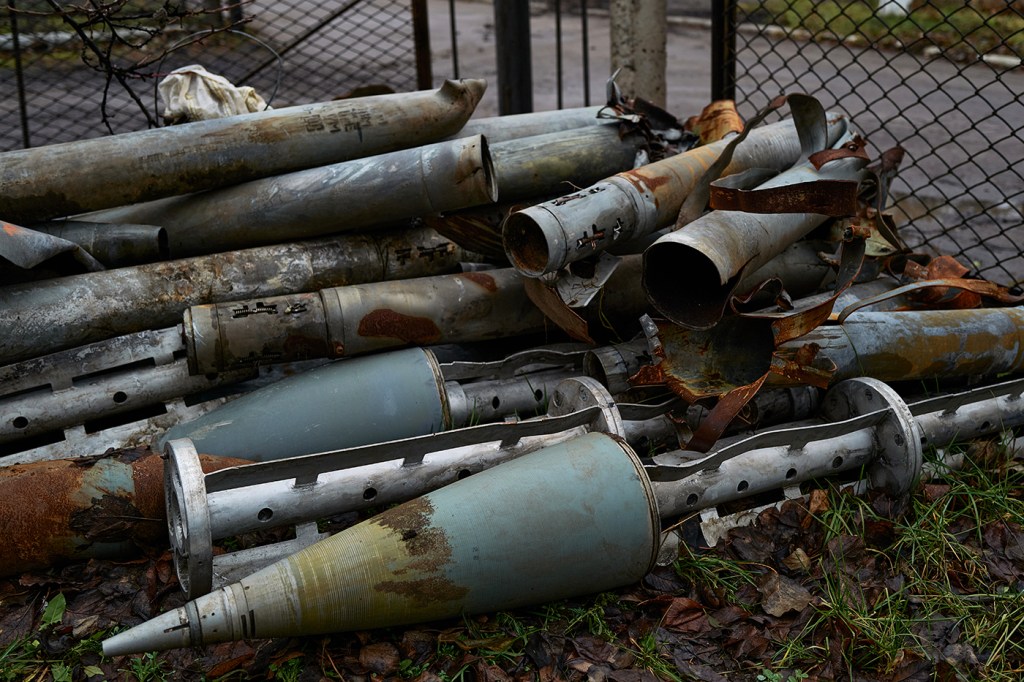Why are cluster munitions, or cluster bombs, so controversial?

Civilian casualties. Russian propaganda fodder. Tarnishing the legacy of Princess Diana?
Yep, even that is among the risks of the United States’ decision to provide Ukraine with controversial cluster munitions.
“It’s a risk—a calculated risk for sure but it’s a risk,” Pablo Calderon Martinez, an associate professor in politics and international relations at Northeastern University in London, says of the decision. “These are more or less land mines—which brings up the image of Diana as well.”

Last week, the Biden administration announced it would begin supplying cluster munitions—weapons that release smaller, lethal submunitions—to Ukraine despite objections from human rights organizations and key allies.
The objections are particularly on display in the United Kingdom. The U.K. is one of nearly 125 nations that signed a treaty outlawing the use, transfer, production or stockpiling of cluster munitions. The United States is not a signatory, nor are Russia or Ukraine, and the weapons have been used by both Russia and Ukraine in the current conflict. Nevertheless, President Biden visited the U.K. this week on his way to a NATO summit and got an earful from the press and the prime minister about what the president called a “difficult” decision.
So, why are cluster munitions, or cluster bombs, so controversial?
There are several considerations—ethical, military and political—surrounding the weapons.
Ethically, Calderon Martinez says that they are certainly not the “smart” or “surgical” weapons that have been increasingly prevalent in modern warfare, with the smaller munitions capable of spreading over an area the size of several football fields, according to the Cluster Munitions Coalition, which works to eliminate the weapons. This can lead to civilian casualties if the cluster bombs are used in areas with civilians.
Secondly, not all the smaller submunitions typically explode—although Calderon Martinez notes that there is a higher rate of duds for Russian-made cluster bombs (40%, according to Washington) than those from the United States (2.3% duds). But this still means that unexploded bombs essentially litter battlefields, posing a risk to civilians for years after a conflict ends.
“They are very controversial and very taboo,” Calderon Martinez says. “Mainly because they are perceived as unreliable.”
However, cluster munitions are effective, particularly against tanks and artillery, Calderon Martinez says. And in what Calderon Martinez says is becoming a “war of attrition” between Russia and Ukraine, the hope is that Ukrainian use of the weapons will break the stalemate.
“We’re just waiting to see who’s going to run out of resources first,” he says. “Ukraine has all the weapons it needs, because of NATO, but it doesn’t have the personnel. Russia is in the opposite position; it doesn’t have an issue with the personnel, but doesn’t have the resources.”
But the political considerations are perhaps the most complex.
“Strategically thinking, in military terms it makes sense,” Calderon Martinez says. “But politically, I’m not sure it’s the right call.”
Ukraine has vowed to only use the cluster munitions in its own country. But Calderon Martinez notes the boundaries of Ukraine are currently in dispute…what about Crimea or Donetsk?
Moreover, what if there is a mistake and the munitions were used in Russian territory and killed Russian civilians? Putin’s propaganda machine would amplify the deaths, Calderon Martinez says, enabling Russia to claim that the United States and Ukraine are no different in harming and killing civilians. And that could diminish the United States’s standing—and Ukraine’s standing—in the larger world.
“Propaganda is not just for the Russian domestic audience, it is primarily for other countries where this propaganda has an audience,” Calderon Martinez says. “In the United Nations, it’s not as overwhelmingly everybody against Russia. This will in some ways help Putin if it doesn’t work militarily.”
Perhaps the most politically fraught area, however, is the decision’s impact on the “special relationship” between the United States and the United Kingdom.
The U.K. often feels as if it has always been “a junior partner” in this relationship, Calderon Martinez says. The United States going it alone on this decision—along with domestic events such as Brexit and the sluggish U.K. economy amid high inflation—reinforces the dynamic of the United States as the dominant partner … particularly since the relationship is already a little fraught given the political differences between the Biden Administration and the conservative government in the U.K.
“It compounds on the feeling in the U.K. that the U.K. is maybe not what it used to be, that there are problems in the marriage with the U.S.,” Calderon Martinez says. “In military circles, there is some acceptance that it needed to be done, but regret that it had to be done—that we had gotten to this point.”
Of course, there is also no guarantee that the cluster munitions will prove decisive.
“We don’t know the way the war will evolve,” Calderon Martinez says. “And that’s the reality—and that’s what I think makes everybody a little bit nervous.”
Cyrus Moulton is a Northeastern Global News reporter. Email him at c.moulton@northeastern.edu. Follow him on Twitter@MoultonCyrus.






